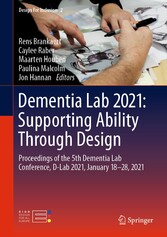
Dementia Lab 2021: Supporting Ability Through Design - Proceedings of the 5th Dementia Lab Conference, D-Lab 2021, January 18-28, 2021
von: Rens Brankaert, Caylee Raber, Maarten Houben, Paulina Malcolm, Jon Hannan
Springer-Verlag, 2021
ISBN: 9783030702939
Sprache: Englisch
145 Seiten, Download: 6487 KB
Format: PDF, auch als Online-Lesen
Mehr zum Inhalt

Dementia Lab 2021: Supporting Ability Through Design - Proceedings of the 5th Dementia Lab Conference, D-Lab 2021, January 18-28, 2021
| Organization | 6 | ||
| Scientific Committee | 6 | ||
| Organizing Committee | 6 | ||
| Preface | 8 | ||
| Contents | 10 | ||
| 1 Scaling Participatory Methods for Cultural Change in Long Term Care Homes | 12 | ||
| Abstract | 12 | ||
| 1 Shifting from Institutionalized Patient-Centered Care, to Social, Person Directed Care | 12 | ||
| 2 Partnering to Integrate Participatory Design Research Practice into Care Innovation | 13 | ||
| 3 Culture Creating Strategy | 14 | ||
| 4 Scaling Participation | 15 | ||
| 4.1 Problem Finding: Developing Themes | 15 | ||
| 4.2 Scaling the Reach of the Voices We Heard: Communication Designed to Re-Frame the Future | 17 | ||
| 4.3 Regional Strategy Launch “Come Alive”: Create the Space for Health Care Workers to Lead Co-creation Activities | 18 | ||
| 4.4 Tools Designed for Person-Directed Culture Development | 20 | ||
| 5 Pandemic Pivot | 22 | ||
| 6 Conclusion | 23 | ||
| References | 23 | ||
| 2 The Challenges of Creating Design Requirements for Products for People with Dementia | 25 | ||
| Abstract | 25 | ||
| 1 Introduction | 25 | ||
| 2 Challenges & Uncertainties About Creating a List of Requirements for ‘Good’ Products for People with Dementia | 27 | ||
| 3 Tackling the Challenges and the Uncertainties | 28 | ||
| 3.1 Expert-Led Study | 28 | ||
| 3.2 Creating the Initial Lists of Requirements: Person-Centered Dementia Care and Quality of Life as a Starting Point | 29 | ||
| 3.3 Rethinking Design Requirements for Products for People with Dementia | 31 | ||
| 4 Integrating the Insights into a Certification List on Leisure | 32 | ||
| 5 Conclusion and Critical Remark | 33 | ||
| Acknowledgements | 34 | ||
| References | 34 | ||
| 3 Designing Conversations: Using Life Stories to Improve Dementia Care | 36 | ||
| Abstract | 36 | ||
| 1 Background | 36 | ||
| 2 Transitions | 38 | ||
| 3 A Design Approach | 39 | ||
| 4 Case Study 1—Knowing the Person | 39 | ||
| 4.1 Method | 39 | ||
| 4.2 Results | 40 | ||
| 4.3 Summary of Findings | 45 | ||
| 4.4 Person-Centred Design Development of a Reminiscence and Conversation Kit | 46 | ||
| 5 Case Study 2—Perspectives | 47 | ||
| 5.1 Relationship Building & Identity | 48 | ||
| 5.2 Co-creation & Personalization | 49 | ||
| 5.3 Storytelling & Validation | 52 | ||
| 5.4 The Research Study | 52 | ||
| 5.5 Method | 52 | ||
| 5.6 Findings | 53 | ||
| 5.7 Next Steps | 54 | ||
| 6 Discussion | 55 | ||
| 7 Conclusion and Future Work | 56 | ||
| References | 56 | ||
| 4 Exploring How a Multisensory Media Album Can Support Dementia Care Staff | 59 | ||
| Abstract | 59 | ||
| 1 Introduction | 59 | ||
| 2 Background | 60 | ||
| 2.1 Multisensory Stimulation | 60 | ||
| 2.2 Reminiscence in Care Practices | 60 | ||
| 3 Designing the Multisensory Media Album | 61 | ||
| 3.1 Methodology | 61 | ||
| 3.1.1 Observation and Creative Workshop | 61 | ||
| 3.2 Design Rationale | 61 | ||
| 3.3 Design Description | 62 | ||
| 4 Engaging with the Multisensory Media Album | 63 | ||
| 4.1 Study Setup | 63 | ||
| 4.2 Care Staff’s Duties and Responsibilities | 63 | ||
| 4.3 Interactions Between Care Staff and Residents | 64 | ||
| 4.4 Care Staff’s Thoughts on the Design | 65 | ||
| 4.5 Context of Using the Design | 66 | ||
| 4.6 Regular Caregivers’ Time Constraints | 66 | ||
| 5 Discussion | 67 | ||
| 6 Conclusion | 68 | ||
| Acknowledgements | 68 | ||
| References | 68 | ||
| 5 Your Moments: Co-designing a Personalized Audio Player | 70 | ||
| Abstract | 70 | ||
| 1 Introduction | 70 | ||
| 2 Approach and Results | 71 | ||
| 2.1 Participants | 71 | ||
| 2.2 A Brief Introduction of the Process | 72 | ||
| 2.2.1 Final Design: Audio Player ‘Your Moments’ | 73 | ||
| 2.3 Results of Phase 1: Two Design for One Processes | 73 | ||
| 2.4 Results of Phase 2: Exploring Personalization with a New Participant by Continuing with the Earlier Results of Phase 1 | 75 | ||
| 3 Discussion | 75 | ||
| References | 77 | ||
| 6 Lessons Learned from Remote User-Centered Design with People with Dementia | 79 | ||
| Abstract | 79 | ||
| 1 Introduction and Background | 79 | ||
| 2 Method | 81 | ||
| 2.1 Data Collection and Analysis | 81 | ||
| 2.2 Participants | 82 | ||
| 3 Findings | 84 | ||
| 3.1 Benefits | 84 | ||
| 3.2 Challenges | 84 | ||
| 4 Discussion | 85 | ||
| References | 86 | ||
| 7 Smile: Capturing and Sharing Personal Photos to Stimulate Social Relations and Support Self-Identity in Dementia | 89 | ||
| Abstract | 89 | ||
| 1 Introduction | 89 | ||
| 2 Photos in Care Homes | 91 | ||
| 3 Smile: Camera-Based System | 91 | ||
| 4 Method | 93 | ||
| 4.1 Setting and Participants | 93 | ||
| 4.2 Ethics and Privacy | 93 | ||
| 4.3 Data Collection and Analysis | 93 | ||
| 5 Results | 94 | ||
| 5.1 A Snapshot of the Everyday Life of the Resident | 94 | ||
| 5.2 Enhancing Quality in Social Encounters | 94 | ||
| 5.3 Offering Dignity and Normalcy | 95 | ||
| 5.4 Improvements for Design | 96 | ||
| 6 Discussion | 96 | ||
| 6.1 Strengthening Social Relations in Long-Term Care | 96 | ||
| 6.2 Moments of Dignity and Recognition of Identity | 97 | ||
| 6.3 Limitations and Future Work | 97 | ||
| 7 Conclusion | 98 | ||
| References | 98 | ||
| 8 An Immersive Art-Based Approach to Engaging with the Embodied, Sensory and Affective Experience of Living with Dementia | 100 | ||
| Abstract | 100 | ||
| 1 Introduction | 100 | ||
| 2 Background | 101 | ||
| 2.1 The Immersive Experience | 102 | ||
| 3 Methodology | 102 | ||
| 3.1 The Participants | 102 | ||
| 3.2 Experiential and Interpretative Analysis | 103 | ||
| 3.3 Script Development | 104 | ||
| 3.4 Character Construction | 105 | ||
| 3.5 Virtual Production | 105 | ||
| 3.6 The Virtual Character | 105 | ||
| 4 Conclusion | 106 | ||
| References | 108 | ||
| 9 Assembling a ‘We’: Tracing the History of My Doctoral Research to the People Who Helped Shape It | 110 | ||
| Abstract | 110 | ||
| 1 Introduction | 110 | ||
| 2 The Life Story Project | 111 | ||
| 2.1 The Life Story Process | 112 | ||
| 2.2 Ethical Considerations | 112 | ||
| 3 Maria | 113 | ||
| 3.1 Maria’s Wartime Story | 113 | ||
| 4 Antonella | 114 | ||
| 4.1 Antonella’s Family Story | 114 | ||
| 5 My Current Research: The Linking Lives Through Care Study | 115 | ||
| 5.1 Background to the Study | 115 | ||
| 5.2 A More Inclusive Communication Environment | 116 | ||
| 5.3 Different Ways of Knowing | 117 | ||
| 6 Conclusion | 117 | ||
| References | 117 | ||
| 10 Estonian Museums and People with Dementia: Experiences and Challenges | 119 | ||
| Abstract | 119 | ||
| 1 Introduction | 119 | ||
| 2 Materials and Methods | 121 | ||
| 3 Estonian Museums and Aging Adults | 122 | ||
| 4 Museum Staff Experience with People with Dementia | 123 | ||
| 5 Museum Staff’s Training Possibilities and Potential Partners | 124 | ||
| 6 Museums’ Challenges: Cultural Policy and Financial Resources | 126 | ||
| References | 127 | ||
| 11 Co-creating Design Opportunities for Social Technology in the Context of Dementia | 129 | ||
| Abstract | 129 | ||
| 1 Introduction | 130 | ||
| 1.1 Social Interaction Within the Context of Dementia | 130 | ||
| 1.2 Design and HCI in Dementia Care | 130 | ||
| 1.3 Technology and Design for Social Health | 131 | ||
| 1.4 Dementia Dynamics in Design | 131 | ||
| 2 Method | 132 | ||
| 2.1 Social Interaction Within the Context of Dementia | 132 | ||
| 2.2 Participants and Setting | 132 | ||
| 2.3 Ethics | 134 | ||
| 2.4 Data Collection and Analysis | 135 | ||
| 3 Results | 135 | ||
| 3.1 Social Needs of People with Dementia that Live Self-reliant | 135 | ||
| 3.2 Barriers in Engaging in Social Interactions or Activities | 136 | ||
| 3.3 Strategies Used by People with Dementia and Their Families to Mitigate the Impact of the Condition on Social Interactions | 137 | ||
| 3.4 Difficulties in Using Existing Social Technologies | 138 | ||
| 3.5 Initiative | 139 | ||
| 4 Discussion | 139 | ||
| 4.1 Design Considerations for Social Technology | 139 | ||
| 4.1.1 Compensating for Internal and External Barriers Experienced by People with Dementia Through Design | 139 | ||
| 4.1.2 Enhancing Agency Through Social and Physical Environment | 140 | ||
| 4.1.3 Learning from Previous Experiences with Existing Social Technologies | 140 | ||
| 4.2 Recommendations for Future Research in Social Technology for People with Dementia | 141 | ||
| 4.2.1 Embracing the Importance of a Broader Social Context | 141 | ||
| 4.2.2 Sharing Meaningful Activities | 141 | ||
| 4.2.3 Incorporating Social Contact into the Everyday Routines | 141 | ||
| 5 Conclusion | 141 | ||
| Acknowledgements | 142 | ||
| References | 142 |







